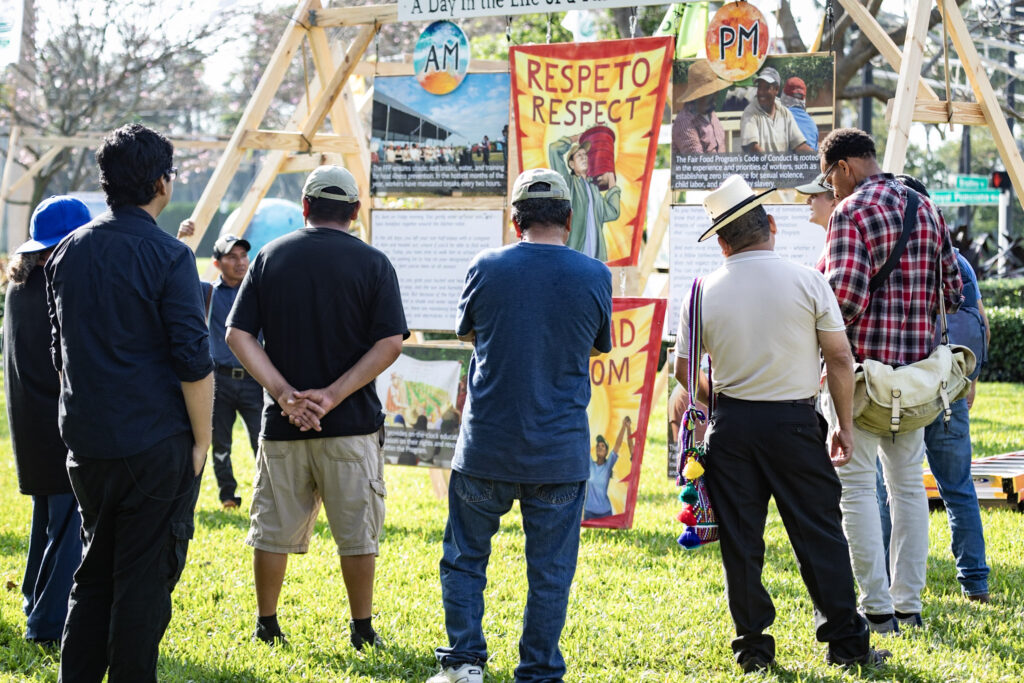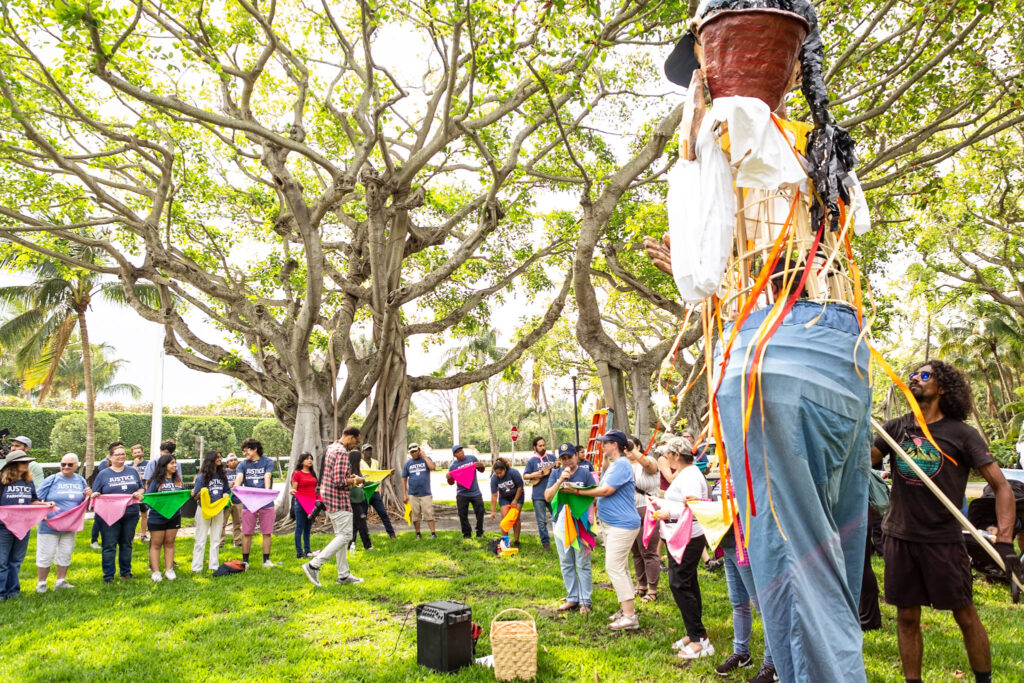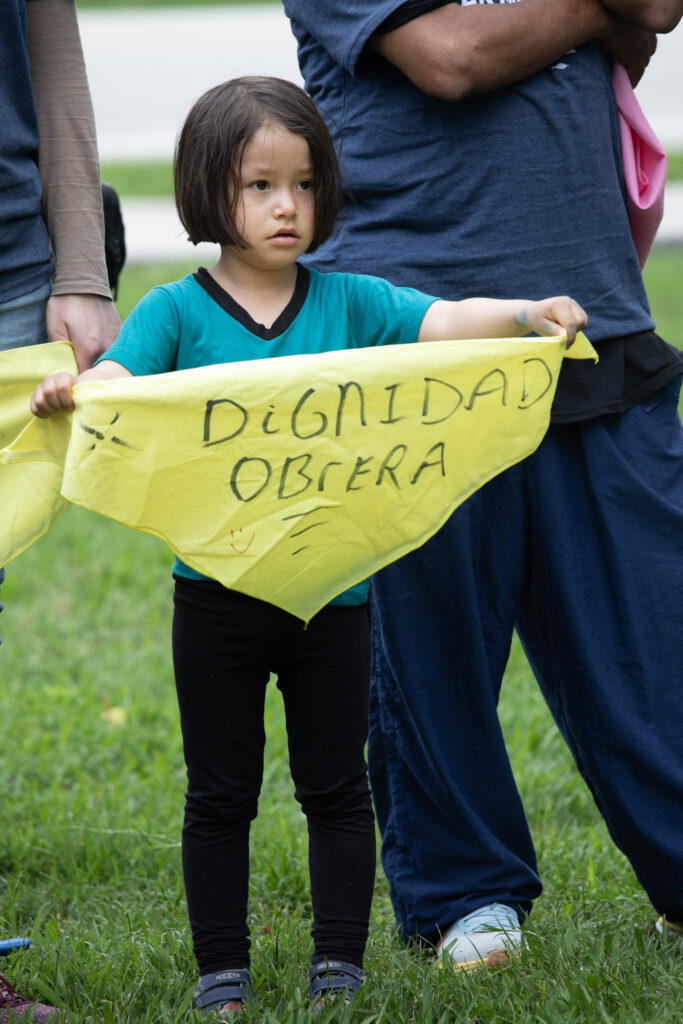
Lupe Gonzalo, CIW: “We wanted as workers to leave the place where we live and the place where we work, and come here to the place Nelson Peltz lives, to show him our faces as humans, and invite him to be part of this program.”
Fast Company, on the Pilgrimage and Esperanza: “The puppet served as a physical embodiment of the sentiment that farmworkers like Nely Rodriguez wanted to capture through the Farmworker Freedom Festival, a three-day event put on by the Coalition of Immokalee Workers (CIW), an organization that advocates for the rights of farmworkers. “We wanted to make her larger than life,” Rodriguez says of the puppet, whose name means “hope” in Spanish. “That’s the size of the hope that we have.”
Sunday, March 10th, saw the culmination of the first-ever Farmworker Freedom Festival in Palm Beach with a powerful ceremony designed to bring the Fair Food Nation’s message of hope home to Wendy’s Board Chair Nelson Peltz. Farmworkers, their families and their allies gathered in a gorgeous park across the street from Peltz’s beachside mansion, where they shared, framed by giant banyan trees, the hopes of the farmworker community for a future of partnership with Wendy’s — a partnership to empower workers themselves to monitor and enforce their own human rights through the expansion of the Fair Food Program to Wendy’s produce suppliers.
A select number of journalists were present at the park to document the extraordinary Pilgrimage, while more wrote remotely about it as the day unfolded. And today we are excited to share with you this round-up of their coverage!
Starting off, we have an article from Palm Beach Daily News, Nelson Peltz’s hometown paper that captured each day of the Festival’s proceedings, including its finale in the Pilgrimage of Hope. You can read an excerpt of their final day’s report below, and make sure to read the full article here.

Farmworkers, supporters rally near Wendy’s board chairman’s home in Palm Beach
By Kristina Webb and Diego Diaz Lasa
Dozens of farmworkers and their allies of all ages gathered Sunday in Palm Beach, the third and final day of the Farmworker Freedom Festival presented by the Coalition of Immokalee Workers to highlight the Fair Food Program.
Their goal on a sunny morning in one of the wealthiest towns in the United States: to draw attention to fast-food giant Wendy’s and call on the company to join the Fair Food Program…
Sunday’s event was called “Pilgrimage of Hope,” a nod to the group’s optimism that more workers can be helped as more companies join the Fair Food Program, organizers said.
The program, founded in 2011, includes restaurants and retailers — such as McDonald’s and Whole Foods — that pledge to buy only from suppliers who follow a code of conduct designed to protect workers’ rights. Supporters of the program have said that workers in those companies’ supply chains are better compensated, treated more fairly and overall receive better benefits than those who work for companies that do not participate in the program…
“A pilgrimage for us is our ability to come here where Nelson Peltz lives and invite him into this hopeful program,” said Lupe Gonzalo, a former farmworker who does community outreach for the Fair Food Program. “We wanted as workers to leave the place where we live and the place where we work, and come here to the place Nelson Peltz lives, to show him our face as humans, and invite him to be part of this program.
Organizers brought to the small park the 16-foot-tall farmworker puppet named Esperanza that was a constant presence throughout the three-day festival. The puppet, whose name translates to “hope,” represents the farmworkers who have better working conditions because of the Fair Food Program and their hope for the program’s continued expansion, organizers said.
The Palm Beach Daily News also sent a photographer to capture the Pilgrimage of Hope for a visual report, which you can see by clicking here.
After Sunday, one of the headline speakers of the Pilgrimage, the CIW’s own Nely Rodriguez, spoke to Fast Company about the urgency of providing safety for women in agriculture, and the importance of the CIW’s hope for Wendy’s to extend that safety to thousands more farmworkers by signing onto the Fair Food Program. Check out an excerpt below or read the full article here.

In Palm Beach, farmworkers are ramping up pressure on Wendy’s to ensure worker protections
By Pavithra Mohan
During the Farmworker Freedom Festival last weekend, workers celebrated their hard-won protections—while also calling on Wendy’s to join their cause.
This past weekend, hundreds of farmworkers took to the streets of Palm Beach, Florida—an enclave for billionaires like Nelson Peltz, the chairman of Wendy’s and its largest shareholder. By their side was a 15-foot puppet in the form of an imagined farmworker named Esperanza, who led the way as workers embarked on a pilgrimage to the neighborhood of Peltz’s sprawling beachfront estate.
The puppet served as a physical embodiment of the sentiment that farmworkers like Nely Rodriguez wanted to capture through the Farmworker Freedom Festival, a three-day event put on by the Coalition of Immokalee Workers (CIW), an organization that advocates for the rights of farmworkers. “We wanted to make her larger than life,” Rodriguez says of the puppet, whose name means “hope” in Spanish. “That’s the size of the hope that we have.”
The farmworkers were in Palm Beach to celebrate more than a decade of winning workplace protections through the Fair Food Program—an initiative started by the CIW to improve working conditions on farms—and to send a message to Wendy’s, which is one of just a handful of major produce buyers who have refused to participate in the program. “The invitation that we’re trying to make to Nelson Peltz is that it’s important for him to reflect on the great power that he has, and the opportunity that he has to prevent the kinds of injustice and abuses that occur with agriculture workers,” Rodriguez says.
On Sunday, when workers brought Esperanza to Peltz’s doorstep, they took bandanas inscribed with their messages of hope and tied them together, creating a chain that they draped over the puppet. The bandanas symbolized the face covers that farmworkers often wear on the job to help shield them against the harsh sun and dust they endure in the fields.
“This was a really inspiring moment for me,” Rodriguez says. “It was an emotional thing to see and to participate in, as each worker put their bandana on this offering.” For Rodriguez and other female farmworkers, those bandanas don’t just protect against the elements. “We’ve seen and experienced the tremendous fear that women in the fields [face],” she says, “worrying that they’re going to lose their jobs and crying into those bandanas out of frustration and wishing that things were different.”
Beyond making a plea to Peltz and Wendy’s, the CIW also used the Farmworker Freedom Festival as an opportunity to highlight the working conditions that many farmworkers continue to face; an exhibit called the Modern-Day Slavery Museum documented the history of forced labor in Florida and how the practice continues to this day. Farmworkers have long faced some of the worst abuses on the job, from wage theft and sexual misconduct to instances of forced labor. (They were also some of the most vulnerable people during the pandemic, as frontline workers who often lived in close quarters.)
When Rodriguez first came to the U.S. and started working on farms, she knew very little about her rights as a worker, or what kind of recourse she had if a boss physically hurt her or behaved inappropriately. “It was well known that when a new woman would come and work on the crew, [bosses] would just pick them out as their own,” she recalls. “Sometimes they wouldn’t let the men working on the crew talk to women, because the idea was the women on the crew were the property of the crew leader.”
The Fair Food Program has changed these dynamics on many farms, according to Rodriguez and other workers. The origin of the program dates back to the late 1990s and grew out of the farmworkers’ protests and appeals to farm owners…
News of the first-ever Farmworker Freedom Festival spread far and wide, even reaching the pages of Mexico’s leading daily newspaper, La Jornada. Be sure to check out this Spanish-language recap courtesy of La Jornada, as well as this local news report of the Pilgrimage of Hope, which aired last Sunday evening!
And if you didn’t get to read our own daily updates on the three-day festival, including exclusive video recaps, you can read our reports from Days 1-3, linked below:
- Farmworker Freedom Festival lands in the heart of Palm Beach with message of “Esperanza” for Fair Food future!
- Day 2 of Farmworker Freedom Festival: Consciousness + CULTURE = Change!
- Day 3 of the Farmworker Freedom Festival in Palm Beach: Hope comes home…
Stay tuned for more media reports on the Campaign for Fair Food and the ever-expanding Fair Food Program!


